In Fort Myers Slip-and-Fall Lawsuits, Witness Statements May Be Key
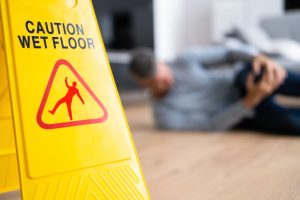 Witnesses can play a pivotal role in any Florida personal injury case – and that includes Fort Myers slip-and-fall lawsuits (also known as Premises Liability lawsuits). Sometimes with the ubiquitous presence of security and cell phone cameras, it’s easy to forget that the firsthand accounts of other people can be invaluable in helping us reconstruct what happened and who was at-fault.
Witnesses can play a pivotal role in any Florida personal injury case – and that includes Fort Myers slip-and-fall lawsuits (also known as Premises Liability lawsuits). Sometimes with the ubiquitous presence of security and cell phone cameras, it’s easy to forget that the firsthand accounts of other people can be invaluable in helping us reconstruct what happened and who was at-fault.
Even with video evidence, some of the strategic reasons Fort Myers slip-and-fall injury attorneys will present witness testimony of an incident:
- Corroboration. A witness – particularly one that has no connection to the plaintiff/injured person – can back up the plaintiff’s story. This not only bolsters the plaintiff’s credibility, but also strengthens their case by providing additional evidence of the defendant’s negligence. Judges and jurors are going to be more convinced of the testimony you’re providing if multiple other witnesses are consistently saying the same thing.
- Observations you may have missed. When a person is seriously injured, their focus in that moment can sometimes narrow to the pain point. This might cause them to miss key bits of information that might prove crucial to the case. Witnesses can help fill in the blanks.
- Establishing actual or constructive knowledge. Florida slip-and-fall claims aren’t easy to win. F.S. 768.0755, Florida’s slip-and-fall statute, requires evidence that the defendant/property owner had actual or constructive knowledge of a dangerous condition on site and failed to take action to remedy it. It should noted that this statute affects only cases when a transitory foreign substance is involved- The witnesses are sometimes even employees of the defendant – sometimes provide this evidence by detailing their actual knowledge of the hazard (ex: “I saw the spill and told my manager, but nothing was done to fix it or warn customers”) or testimony that the condition had existed for some time or occurred with regularity (thereby establishing constructive knowledge).
To be useful in a Fort Myers slip-and-fall case, eyewitness testimony needs to come from a person with firsthand knowledge of relevant events, a good memory, a consistent story and decent credibility. They must also be willing to testify in court. While written statements can be helpful to your lawyer’s investigation, they may be considered inadmissible in court as hearsay without the witness’s willingness to swear to it under oath.





 Florida Personal Injury Lawyer Blog
Florida Personal Injury Lawyer Blog



 As far as workplaces go, construction sites are among the most precarious. The
As far as workplaces go, construction sites are among the most precarious. The  In any Florida premises liability case, the question of whether the defendant is responsible for the harm someone else suffered on their property often depends heavily on the unique circumstances of the case. Sometimes, that circumstance is a giant ice cream cone.
In any Florida premises liability case, the question of whether the defendant is responsible for the harm someone else suffered on their property often depends heavily on the unique circumstances of the case. Sometimes, that circumstance is a giant ice cream cone.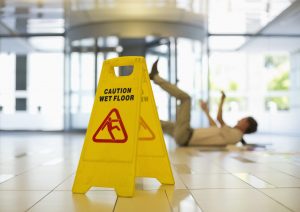 Wet walking surfaces are a top cause of slip-and-fall injuries in Florida. But are businesses required to post a “wet floor” sign to warn you?
Wet walking surfaces are a top cause of slip-and-fall injuries in Florida. But are businesses required to post a “wet floor” sign to warn you?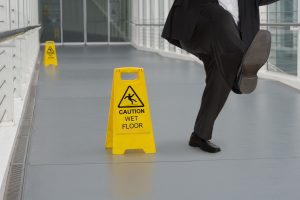
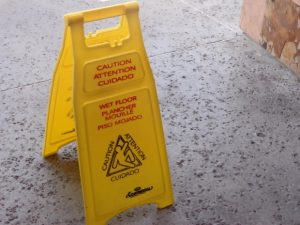 To prevail in a Florida slip-and-fall injury lawsuit, plaintiffs need to prove the business establishment had either actual or constructive notice of the hazardous condition, as outlined in
To prevail in a Florida slip-and-fall injury lawsuit, plaintiffs need to prove the business establishment had either actual or constructive notice of the hazardous condition, as outlined in 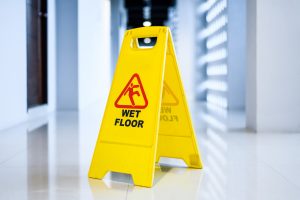 Guests who are injured on someone else’s property may have the option of filing a claim to be compensated for injuries by the property owner. These are a type of premises liability claims, and one example is if a patron at a grocery store is injured in a slip-and-fall accident on a “transitory foreign substance”. To prevail in a
Guests who are injured on someone else’s property may have the option of filing a claim to be compensated for injuries by the property owner. These are a type of premises liability claims, and one example is if a patron at a grocery store is injured in a slip-and-fall accident on a “transitory foreign substance”. To prevail in a 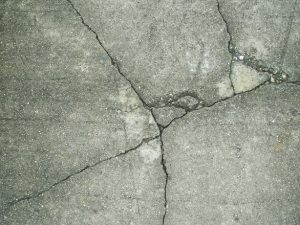 Property owners in Florida are expected to maintain their site in a condition that is safe for patrons, guests, and residents. However, in premises liability cases where an injured person knew or should have known the potential for danger, property owners often raise something called the “assumption of risk defense.”
Property owners in Florida are expected to maintain their site in a condition that is safe for patrons, guests, and residents. However, in premises liability cases where an injured person knew or should have known the potential for danger, property owners often raise something called the “assumption of risk defense.”






